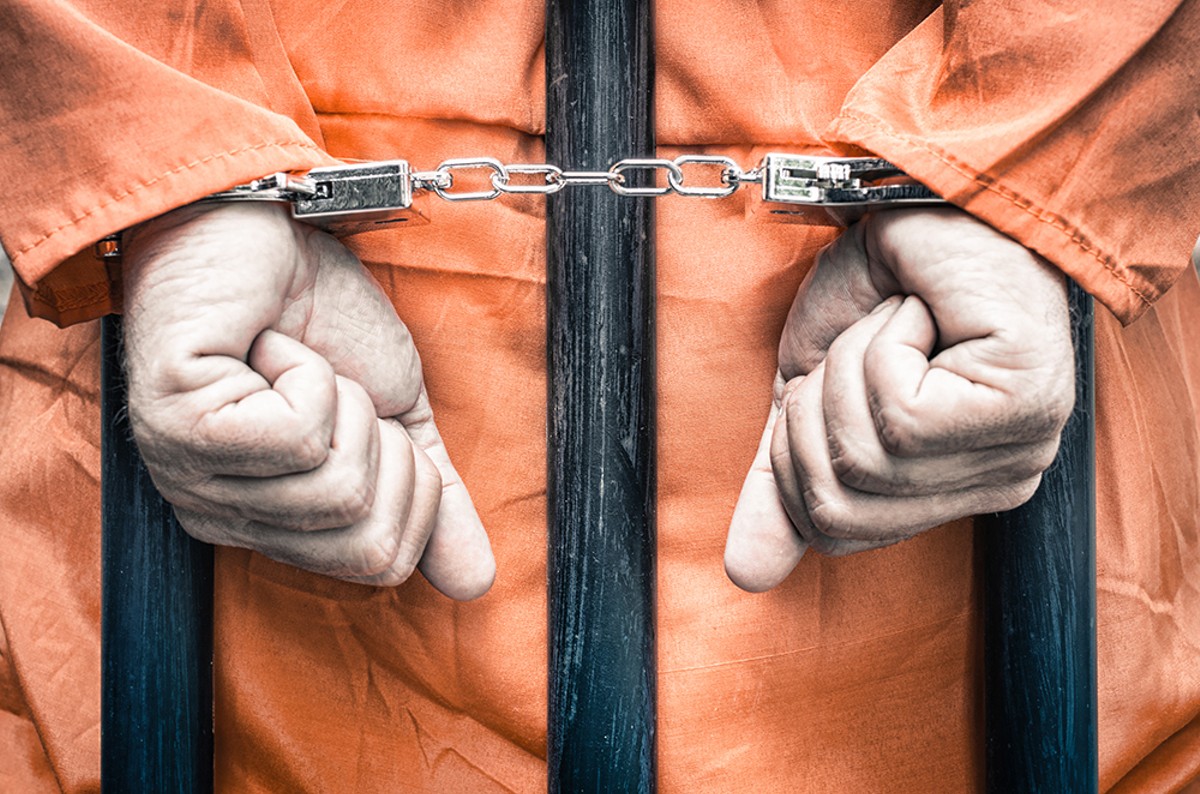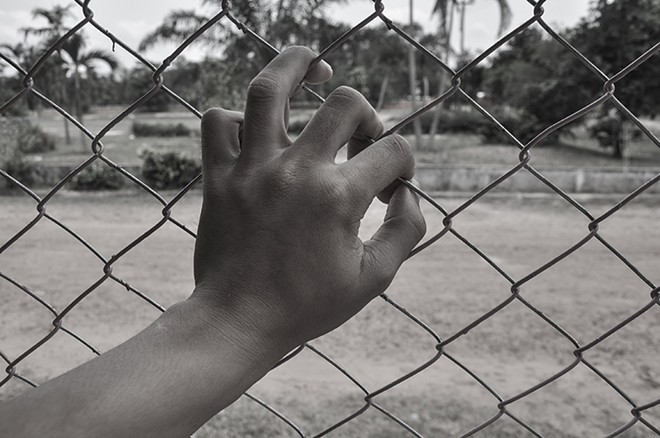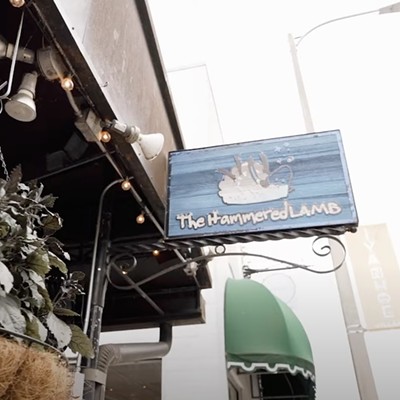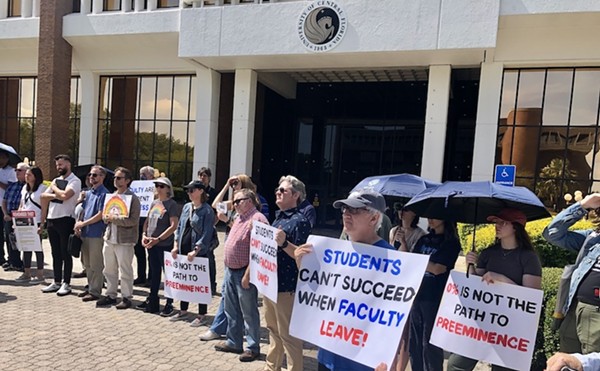Three weeks ago, Giovanni Kali Vega turned 36 inside the Lake Correctional Institution in Clermont. His birthday isn't really a cause for celebration, because it's another reminder that his youth is fading and the world he left behind when he was charged with murder at just 20 years old is not the same. After 16 years in prisons with minimal amounts of sunshine, his skin has faded from its original dark bronze to a pale brown. It's another indication to Vega, who's fighting to prove his innocence, that every day he's incarcerated is a day he could have spent living a normal life.
In 1999, Vega was indicted for allegedly beating to death his girlfriend's 3-year-old son, Xavier Collado, at a Kissimmee Econo Lodge on U.S. Highway 192. The state charged him with first-degree murder and aggravated child abuse after Collado died at Arnold Palmer Hospital for Children. A jury found Vega guilty in 2001, sentencing him to life in prison. Since the beginning, Vega has maintained he didn't kill Xavier, and after Vega's conviction, the medical examiner who performed Xavier's autopsy was forced to resign in lieu of facing further disciplinary action. After years of appealing his case, a state appeals court finally remanded a new hearing last year. But for various reasons, the case has stagnated, leaving Vega and his family frustrated.
"I want to get on with my life," he says. "I want to have children, get married, own a home, go on a cruise with my mom. I hate every minute of this place."
No matter where Aurora Arroyo goes, she's always near a big five-pound bag filled with court documents, appeals, letters and information about Vega, her son. She lugs it to and from her work at the Florida Department of Education every day, just in case he wants copies of a document or needs her to research information.
"I'm like his paralegal," she says. "He writes the court documents on lined paper and then I type them up for him. He's his own lawyer."
Vega was born in 1979 in Massachusetts to Arroyo, who was a single mother. She gave him her maiden name and left with the baby, taking him to her parents' home in Puerto Rico. While she worked in the United States, her parents raised the boy, and years later, Vega moved with Arroyo to New York. Soon after, they followed many in the Puerto Rican diaspora and moved to Central Florida.
Arroyo says she remembers Vega as a good son who wanted to be a firefighter for the Kissimmee Fire Department and liked to help others, but by the time he was at Poinciana High School, he got mixed in with the wrong crowd. He dropped out early and started dealing drugs as a teenager, she says, often getting in trouble with the law.
It was during this time that he met Tamara Torres, who was three years older than Vega and had two children, 3-year-old Xavier Collado and a 2-year-old daughter. Arroyo remembers that her son brought Torres home to see if his mom could find her a home because she was living out of a suitcase. She remembers the young woman as jittery, like she "needed drugs," and at least once Arroyo babysat the two children. What they didn't know is that in 1997, Torres had been arrested on child neglect, a charge that was later dropped. A report from the Department of Children and Families states that the father of the children, Luis Collado, called police on Torres after he alleged that she locked him out of the house and left her baby daughter alone inside with a "wet diaper and a rash." Torres told police she had gone to get food stamps with Xavier and wanted the baby to sleep.
Vega says he remembers their "on-and-off" relationship as not something serious, but by Nov. 12, 1999, they had been together a week. According to court documents, Torres left the kids at the motel where they were living to go work at Taco Bell in the morning, and then Vega arrived. He told officers he left the room to make a phone call relating to a drug deal using the public phone downstairs. As he returned, he says he saw Xavier lying unresponsive on the landing of the stairwell, with a bruise on his forehead.
Vega grabbed the boy and took him to the bathtub to pour some water on him and get a response. Vega says he left the room to get towels and when he returned, Xavier was still not responding, so he hit him on the face. Vega then called Torres to come take Xavier to the hospital and said later he was scared to call 911 because he was selling drugs.
During his trial, detectives said that Xavier's sister told them Vega was angry with the boy for soiling his pants, and Xavier had told his mother that Vega was beating him in the days before.
Torres took the 3-year-old to Osceola Regional Medical Center, but he was transported to Arnold Palmer Hospital for Children. Hospital staff at ORMC believed Xavier was the victim of child abuse and contacted law enforcement. The Osceola County Sheriff's Office arrested Vega. Deputies got into an "altercation" with him, according to trial transcripts, which Vega remembers as officers beating him into the ground. Detectives later interviewed him while his head was bleeding and ignored his requests for a lawyer because they said he wasn't being specific enough, trial transcripts say. Arroyo says she saw the news while she was at work and immediately felt like someone had punched her in the stomach.
"It took me a year and a half before I was able to stop crying and talk about it," she says. "I couldn't see little kids on the street either or read the legal documents, because I would start crying again. I just lost it."
Torres, who was charged with child neglect and had her daughter taken away, testified against Vega at the trial in 2001, saying that Vega had beaten the child before. Luis Davila, then Vega's defense attorney, asked Torres if she had made a deal with the state for leniency in the child neglect charge against her, and she denied the accusation. Davila also questioned her about bruises on Xavier's body that detectives said were more than a week old – from before Vega moved in with them. Torres, who was last reported as living in Largo, did not respond to several messages requesting a comment. Florida Department of Correction records show Torres was incarcerated from 2008 to 2012 for her 1999 case of neglecting a child with great bodily harm. Records also note that she has several tattoos dedicated to her son, including one of a Pikachu that says, "In Loving Memory, Xavier."
But the star witness for the prosecution in the case was Dr. Shashi B. Gore, then District 9 medical examiner for Orange-Osceola County. Gore performed the autopsy on Xavier, ruling the death a homicide by "subdural hemorrhage due to closed head trauma due to blunt force trauma," according to an autopsy report. Gore testified during the trial that because he observed the inside of Xavier's top lip was torn, he knew the child was "manhandled," saying a single fall could not produce that same injury, only some sort of blunt force.
The state also brought in Christopher Cooper, a nine-time convicted felon, who told the jury Vega confessed to the savage beating within an hour of meeting him in jail. The state maintained Xavier's death was from a rough manhandling of the child's facial area.
A jury took three hours to convict Vega, by then 21, and he was sentenced to life in prison. Arroyo, whom Vega would not allow in the courtroom to spare her the pain, heard the sentencing through the door and fainted. Throughout the trial, Arroyo says she always believed her son was innocent, and nowadays, she often dreams her son comes walking through her front door.
"I just want him home," she says. "The first thing I want to do when he gets out is go sit at the beach with him. I want him next to me, breathing freedom."
Then in 2003, something unexpected happened that had an impact on Vega's case.
The Florida Department of Law Enforcement's Medical Examiners Commission launched an investigation into Gore's autopsy of 10-week-old Alan Ream Yurko. Gore attributed the infant's death to subdural hematoma due to shaken-baby syndrome. The baby's father, Alan Yurko, was charged and later convicted of the murder in 1999. After a complaint filed by the Yurko family in 2003, the Florida Department of Law Enforcement's Medical Examiners Commission began investigating Gore's autopsy findings.
A 2004 panel found Gore had violated Florida statutes and was negligent in the autopsy for several reasons, the major one being that he included a "canned" examination detailing the child's heart, even though the heart was surgically absent because it had been donated. On the final page of the autopsy, Gore originally noted the infant was a 2-month-old black baby, when the baby was actually 10 weeks old and white. After realizing this error, Gore altered his report, which is a public record, without notifying the courts, which amounted to altering evidence.
The commission didn't fire Gore. Instead, it told him to stay out of the morgue and not perform any autopsies until his appointment as district medical examiner ended with his retirement in June 2004. Yurko's conviction for the death of his son was overturned in court later that year, and he was set free.
Dr. Stephen J. Nelson, district medical examiner for the 10th judicial circuit, was the commission's chairman back in 2004 and is in the driver's seat again currently. He says the case was "troubling" and one of the harshest disciplinary actions taken against a medical examiner in Florida at the time. Despite messages sent to an email listed on Florida's Department of Health website for Dr. Gore, he could not be reached for comment on this story.
"Essentially, we negotiated a surrender," Nelson says. "The strategy was done to save everybody the time, money and inconvenience of an administrative hearing. It may not have solved the root of the problem, but we wanted him out of the morgue immediately."
The Yurko case prompted Vega's attorneys to reexamine evidence from his trial. In 2009, Dr. William Anderson, who had worked under Dr. Gore, examined Xavier's autopsy and said he found significant deficiencies in the analysis to Gore's conclusions.
"It is my opinion that the findings need to be critically reviewed and the entire case revisited," he said according to a report made at the request of the defense.
Then in 2012, Dr. Douglas Radford Shanklin, a pathology professor at the University of Tennessee, offered to look at the case for the defense free of charge. He found several irregularities in Xavier's autopsy and came to a different conclusion than the one put forth by Gore. Based on photos of Xavier's sister and the autopsy, Shanklin believed Xavier had contracted a bacterial infection from his sister, who was photographed with lesions on her face. Vega says he remembers going to the store in those days with the kids and buying Neosporin for the girl's face. Shanklin says the infection traveled to the boy's brain, turning into bacterial meningitis, which made him weak enough to collapse as it spread. Shanklin found a high count of white blood cells in the hospital report for Xavier, which he interpreted to mean the boy was fighting off an infection before he was admitted. Shanklin also pointed out in his report a forensic slide of Xavier's brain, which showed what he called "a classic, textbook illustration of bacterial meningitis, which has spread deeply." Shanklin added that meningitis is seriously under-diagnosed in emergency rooms, and that Dr. Gore may have been influenced by the premature call from hospital staff to say it was a child abuse case.
After getting his GED and associate's degree in psychology, Vega began focusing on his trial transcripts with his attorney. Through their research, they found several glaring issues. During jury selection, two women told the judge there was another juror making comments about shooting Vega. The man was not asked to leave and the two women, who said they could be fair, were selected for the jury, but the act had already tainted the entire jury pool, Vega says. During deliberations, the jury asked the judge for trial transcripts, which he declined to give them because they would be "time consuming," according to court documents.
Vega filed appeal after appeal without much result, until finally, in 2014, a breakthrough. Florida's Fifth District Court of Appeals reversed and remanded an evidentiary hearing for Vega based on Shanklin's work.
"We conclude, based on the unique facts of this case, that the findings and conclusions set forth by Dr. Shanklin's report constitute newly discovered evidence," court documents said, "to the extent they support an allegation that the testimony of the medical examiner at Vega's trial was knowingly and patently false (or, at a minimum, given in reckless disregard for the truth)."
Shanklin died in 2013, leaving Vega with no witness and no one to present the evidence he had discovered. Before his death, Shanklin spoke with News 13 about the case, calling it "a gross miscarriage of justice and medical science."
"There's so much evidence in this case of a profound internal disease which caused the death of the child," he told the station. "It boggles my mind how they marched down."
In 2015, Vega's case is still working its way through the system. It has stagnated recently due to fights between him and his attorney, public defender Javier Chavez.
Chavez says his policy is not to comment on open cases. Vega says the disagreements stem from bad communication and Vega's insistence on bringing Nelson and Dr. Jon Thogmartin as witnesses to the case. Both Thogmartin and Nelson testified for Yurko's defense during his new trial, Nelson says. Vega says Chavez has told him Thogmartin and Nelson are not relevant to his particular case.
In a letter to Judge Jon B. Morgan dated June 30, Vega writes, "For the past few weeks, I have mailed, attempted to call ... the public defender forms to Attorney Javier Chavez. ... I am claiming a constitutional violation because I am being denied access to material evidence favorable to my defense."
Morgan has scheduled two hearings to determine whether trial counsel has been ineffective, and in both instances, Morgan has denied Vega's request for a new attorney. Morgan writes in an email that he cannot comment on a pending case. In response, Vega has filed two appeals himself, one in the Fifth District Court of Appeals regarding the Nelson hearing and another in the Florida Supreme Court for ineffective counsel during his original trial. Joanne Simmons and Craig Waters, the respective spokespersons, said neither court has decided as of Thursday whether to take Vega's cases or not.
"I didn't come here after 16 years to be a sitting duck," he says. "I didn't know anything about the law then, but I do now."





















